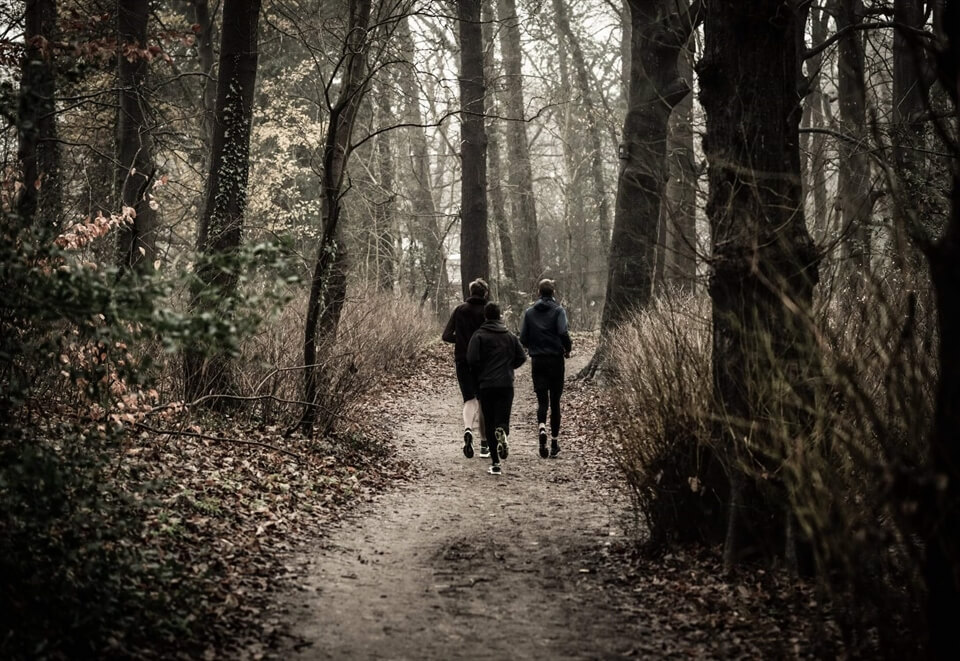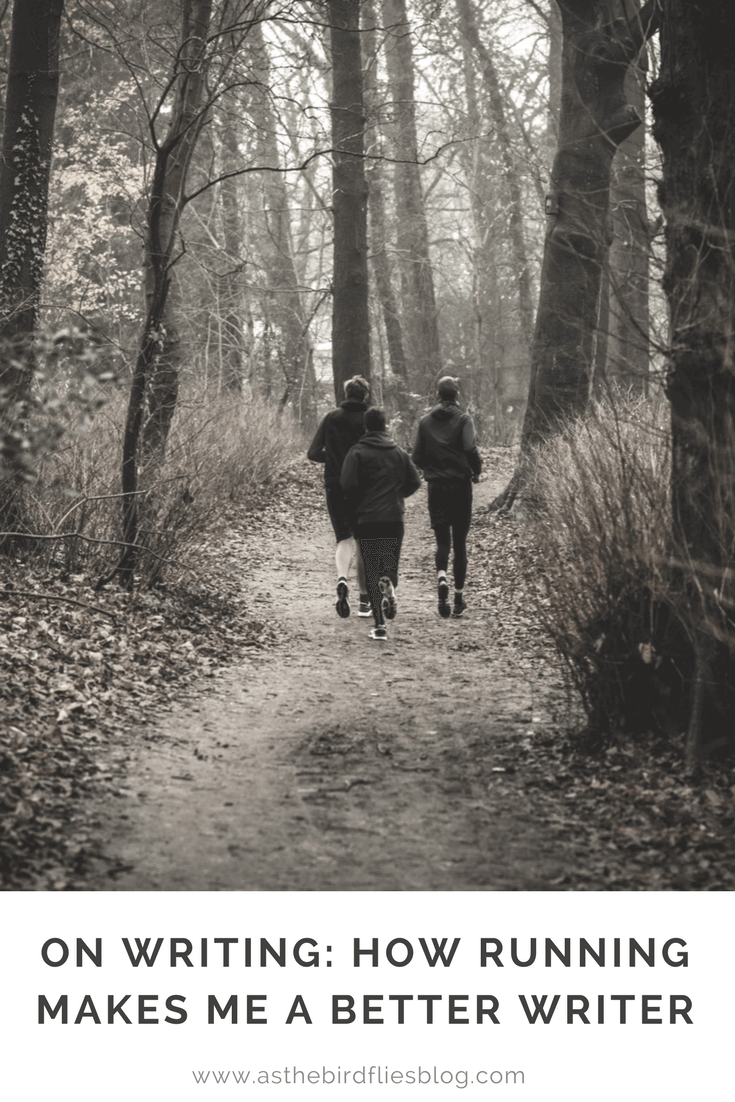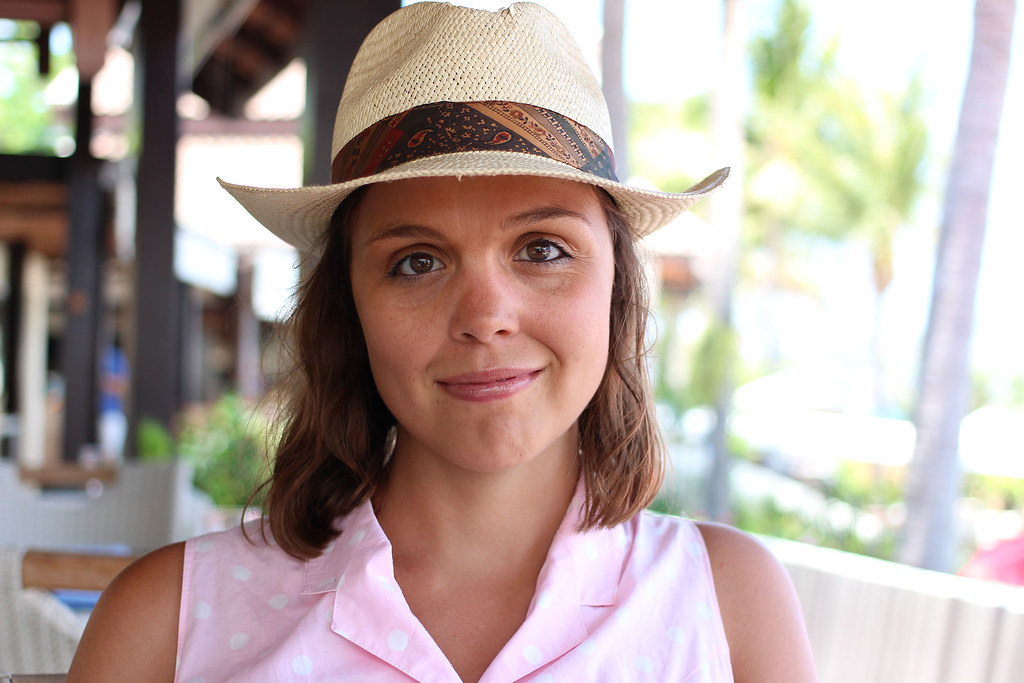On Writing: Why Running Makes Me a Better Writer

While I'm proud to call myself a writer, I'm less proud and a lot more reluctant to call myself a runner. It's not because I don't run regularly - I do, if not as regularly as I write (thank goodness or no books would get finished) - but it's more that I am very slow, not very pretty to look at and have a deeply-rooted love-hate relationship with running. While that quote "I hate writing but love having written" is not true for me because I nearly always love the act of writing (as well as the having written part) I rarely enjoy running, but always enjoy having ran. However, over the years I've been running and writing regularly, I've learnt that there are things about running that I experience which resonate with the writer in me, and it's these things I want to share with you today. Maybe in doing so it will encourage you to try running to help you as a writer, or maybe it will also help you see that running (or another form of physical exercise is already making you a better writer, and you should celebrate this with a mirror high five or slice of cake or something!
First I want to talk a bit about why running is good for your writing life.
Why running makes me a better writer
Most obviously and perhaps importantly, running is a great form of physical exercise and movement. These are two things that anybody working full-time or even part-time as a writer will struggle to get enough of. The writer's life is a very sedentary one (unless you have a standing or walking desk!) and running is the real polar opposite. It's incredibly active, you move a lot and your pulse rate increases considerably. In short, it's a great activity to counteract some of the effects of sitting (or standing) still a lot.
However, this is not the real reason I think running makes me a better writer. I think running makes me a better writer because it also helps with my mental health. I've made no secret of my struggles with post-natal depression and anxiety, but even before the birth of my child I had long used running as a defence to mental health wobbles. The science and research explains why running makes you feel better (hello, endorphins!) but in the context of being a writer, having the mental strength and energy to focus on my work is a gift and I have no doubt writing helps with that.
Another reason I believe running makes me a better writer is because it is uninterrupted, disconnected thinking time. As many people find when they do a physical activity for a long period of time - walking, cycling swimming - there comes a moment when you switch off a bit. It's not that your mind goes quiet - sometimes quite the opposite - but you do get this sense of calm and clarity come in to your thoughts. I don't always get it on all my runs (sadly!) but I liken it to accessing a different, usually sleeping part of my brain, where I can think about things differently. Some of my greatest plot hole solutions and best story ideas have come to me during a run.... as long as I can get home in time to remember to write the answers or ideas down!
There is also something about running that opens my mind to brand new story ideas or to new settings for my story. This is especially true when I run in a new place or on a new terrain. If you're familiar with my books, you may be interested to know that All the Beaches are Made of Pebbles (from Shy Feet) first came to me while running along the seafront in Brighton & Hove. When you run you get a different kind of sense of place, setting, sounds, and light than when you walk. It's hard to explain because surely it should be other way as walking is slower, but perhaps there is something in the deliberateness and physical effort required in running that switches off more of the thoughts rolling around your head and you are suddenly open to discover more...
The things running taught me about writing
In addition to giving me a clear head, less hunched back and reducing my writer's belly to a slight paunch as opposed a 6-month pregnancy, running has given me some important life lessons that
Running is hard. Writing is hard.
This may sound more like an observation than an all-important life lesson, and yes, it is, but there is great comfort in this realisation for me. I began running regularly long before I was writing regularly (ten years ago versus about six years ago) and the learning curve I've been on with both writing and running were similar. At first it felt impossible and hopeless and worthless. I felt I was making no progress, but even so I still felt a small spark of achievement, or at least the potential of accomplishing more. That said, even when I was running ten miles a week, running was still hard. There were still days I desperately didn't want to do it. There were days when my legs felt so heavy. And the same is true for writing. Even though I've published three books and several more short stories, it's still hard to get motivated some days, and on others I find writing 1000 words impossible, when at other times I can do that in half an hour. Writing is hard. Running is hard. But they're still worth it... That's the lesson part I've learned.
Practise makes easier
When I first started running I could barely cover 400 metres without feeling like my lungs were burning. Writing was similarly uncomfortable and difficult. I barely managed 500 words in a session and nearly all of them would end up my Desktop's Recycle Bin (ironically not to be recycled ever ever again!). Both running and writing gave me headaches in the beginning. But the more I did each, the more I made them a habit in my life (and you only need ten minutes to make anything a habit!) the easier it became - slowly, but surely. As I mentioned above, writing and running are still hard sometimes, but it's a different kind of "hard".
Resistance is normal (and the ten minute rule)
There have been books written about the "resistance" writers and other creatives experience when approaching their craft, and the same is surely true of runners and anyone about to embark on physical exercise. This is not a nice feeling. You actively don't want to do something that you know deep down you do want to do, and it's good for you. It's a conflicting, icky kind of feeling and it's no surprise it often gets the better of us and stops us writing or running or whatever else. Having experienced resistance to running BEFORE I began writing regularly, I had learned that it is a feeling that can sometimes be turned around. Someone had once told me that when they didn't want to run or do exercise they would apply the ten minute rule. The ten minute rule means that they had to start running or exercising but if, after ten minutes, they still didn't want to run or exercise they had permission to stop. I did the same with my running and found nine times out of ten I would actually still want to keep going after ten minutes. I have applied the same rule to my writing on days when it feels too hard, and yep, sure enough most of the time, after ten minutes I want to keep going.
You build up a habit, and the distances, step-by-step
Again running taught me about building habits long before I built my writing habit. Running taught me that running a half marathon is something you build up to over several months. Running taught me that you can and will adjust to accommodate more miles - injuries allowing. Running taught me that you have to run a lot of short distances to work up to big distances. These are all lessons that apply to writing too. Stories are rarely (and maybe shouldn't be) written in one sitting. Beginner writers write slower than those who have been tapping away at the keyboard for years. Nobody publishes (or should publish!) a first draft once it's finished. It takes several edits and several long hours of work before you can really go the distance...
Rest. And stretch.
I experienced my first running injury while training for my first half marathon and I learned the hard way what happens when you don't rest enough. Too much running, too little stretching (and only after a run), and not enough rest days gave me a running injury (ITBS if you're interested!) that will probably mean I never run a marathon (which I'm totally okay with!). It's also possible to experience "injuries", or rather burnout. I've learned I'm a much better healthier and more productive writer if I have rest days and often weeks or months in between finished drafts. Writing every day is wonderful, and arguably the best way to build a habit that really sticks, but if that means several hours a day at the computer, that's also a lot of the kind of work that physically and mentally can take its toll. Be proactive about getting rest in between writing sessions.
Also, don't ignore the importance of stretching as a writer. This is possibly the single best thing you can do for your body if you spend a lot of time sitting at a desk or hunched over a laptop. It will help to stretch out cramped muscles and avoid carpal tunnel and repetitive strain injuries.
Going slow is not stopping
When I used to do half marathons or long distances I prided myself on "not stopping" by which I mean "not stopping running". I don't actually stop, bend over and catch my breath as I push down onto my knees, I mean I stop running and I start walking. As I did this on a recent run I realised how silly it was that I considered changing my pace from running to jogging or even walking as "stopping". I wasn't stopping I was still going. I was still moving towards where I aimed to be. This is exactly how I also need to approach my writing. I'm not stopping or stalling or even creating a problem if I take things slowly. I'm still moving in the right direction.
Goals help but are not everything
It wasn't until I started running ten-mile or half marathon distances that I really took running and training semi-seriously (I never gave up alcohol for months, let's just say that!) and this was when I really made progress going from running a steady three miles twice a week to running three or four times a week and for up to eight miles. It was the same with my writing. It wasn't until I took part in NaNoWriMo and set myself the goal of 50,000 words in a month that I saw real progress, and it was the first time I actually finished the first draft of something after years (or even a decade) of starting stories but never finishing them. Having goals and training plans and writing schedules are great for giving your writing or running direction - especially at the beginning - but they can also have downsides. When it came to running, my training schedules were hard to stick to (because of work and other commitments, and eventually my knee injury) and not being able to meet certain distances became very discouraging. Likewise, when I've set myself writing goals in the past and not met them or fallen behind on deadlines, it's easy to beat yourself up about it. Nowadays I only set myself goals with running when I know I have time to meet them and if they're only for short periods of time (i.e. last summer I challenged myself to run every day for ten days to kickstart my habit again). For my writing, I'm more mindful of over-arching goals and I rarely set strict deadlines because with my young son and work commitments there are too many moving parts to stick to a strict schedule. Hopefully in the future that will be possible, but for now I set myself goals that are realistic and feasible rather than ambitious or far-reaching.
It has to be about the journey
Running taught me that while running half marathons and long distances for a pretty medal or a goodie bag were great and achievements to be proud of, but they aren't a reason to run. In the same way, having published books that readers send me emails about is something that makes me smile in a way not many other things do, but that's not the sole source of enjoyment or pride in my writing life. You have to enjoy the journey. As a runner, you have to get something out of those training runs you do, or your regular round the block route. As a writer, you have to find pleasure in composing the stories, building characters and searching for the write words. There has to be a joy in the journey because that is what takes hours, days, weeks, months and years. There has to be joy in the journey, or it's not worth going on.


Frances M. Thompson
Londoner turned wanderer, Frankie is an author, freelance writer and blogger. Currently based in Amsterdam, Frankie was nomadic for two years before starting a family with her Australian partner. Frankie is the author of three short story collections, and is a freelance writer for travel and creative brands. In 2017, she launched WriteNOW Cards, affirmation cards for writers that help build a productive and positive writing practice. When not writing contemporary fiction, Frankie shops for vintage clothes, dances to 70s disco music and chases her two young sons around Amsterdam.
Find Frankie on Facebook, Twitter, Instagram, Pinterest, and Google+.
Find Frankie on Facebook, Twitter, Instagram, Pinterest, and Google+.
 On Writing: My Writing & Publishing Plans for 2023
On Writing: My Writing & Publishing Plans for 2023_x300.jpg?v=1) On Writing: The Year I Decided to Write for My Life
On Writing: The Year I Decided to Write for My Life On Writing: Best (& Easiest!) Creative Habits All Writers Should Try
On Writing: Best (& Easiest!) Creative Habits All Writers Should Try On Writing: How to Earn Money by Writing Stories
On Writing: How to Earn Money by Writing Stories On Writing: What Are The Different Types of Editors?
On Writing: What Are The Different Types of Editors? About the Blog & Frankie
About the Blog & Frankie Welcome to My Amsterdam Travel Blog!
Welcome to My Amsterdam Travel Blog! Welcome to My Luxury Family Travel Blog!
Welcome to My Luxury Family Travel Blog! Welcome to My Writing Blog!
Welcome to My Writing Blog! Lover Mother Other: Poems - Out Now!
Lover Mother Other: Poems - Out Now! I Write Stories That Move You
I Write Stories That Move You Order WriteNOW Cards - Affirmation Cards for Writers
Order WriteNOW Cards - Affirmation Cards for Writers Work With Me
Work With Me